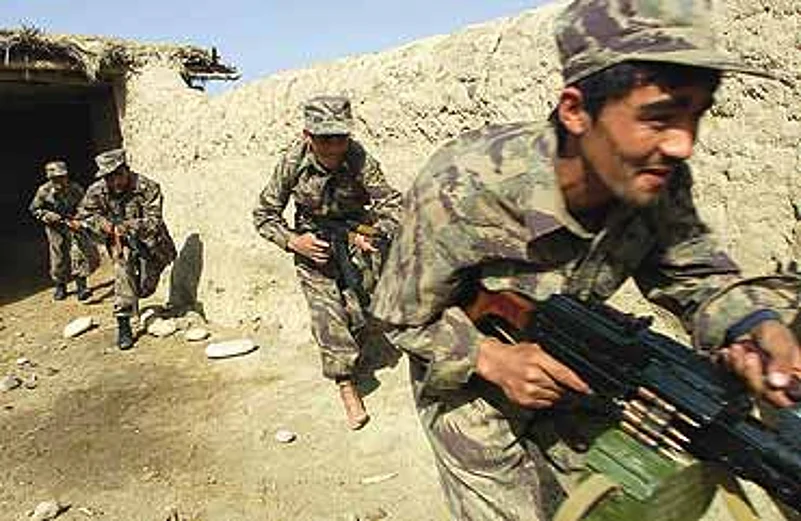
Others, however, think this difference in perception is a precursor to violent disagreements in the future. Says London-based Mark Galeotti, Russian expert with Jane's Defence Weekly: "Russia, Iran and India are all important. But frankly they are not the main players in the latest US operations."
It has served one purpose, though. The strident opposition to the idea of moderate Taliban (Turkey is the latest to join the chorus), and Islamabad's failure to organise an insurrection inside Afghanistan, are perhaps the twin reasons why Powell in his Congressional testimony last week ruled out a dominant role for Islamabad in determining the nature of a future Afghan government. "The next government of Afghanistan cannot be dictated into being by Pakistan," he said. This move was aimed at papering over the cracks even before Washington has realised its current operation's goals.
The quest for establishing influence over Kabul is inextricably entwined with the gas and oil politics of Central Asia, in itself a murky and complicated tale. But as if conflicting international interests were not enough, there's also the gargantuan problem of reconciling conflicting demands of different Afghan groups.
The NA's ability to call the shots is circumscribed because it essentially represents the ethnic minority groups of Afghanistan (see Alliance of Contrarians). This inhibiting factor persuaded the NA to seek alliance with Zahir Shah, a Pashtoon, and provide a national character to the formation. NA deputy foreign minister Mohammad Yunus Qanuni and Shah's representatives struck a deal in Rome to establish a coalition interim government post-Taliban, form a joint supreme council and convene a Loya Jirga.
But the deal has already run into problems; as Shah now is unwilling to accept the NA's claims to 50 per cent seats in the supreme council, stung as he has been by the criticism of forming an alliance with a group representing minorities, and whose record in government between 1992-96 (when it was ousted by the Taliban) was even worse than the Taliban's. These differences could exacerbate if more commanders, including some from the Taliban, were to join the Shah-led coalition and demand a share in any future setup.
Loya Jirga and Zahir Shah have indeed become catchwords for all those who wish to have a stake in a post-Taliban government. Last week, for instance, Pir Sayed Ahmad Gailani's National Islamic Front of Afghanistan organised a two-day National Assembly for Peace and National Unity in Peshawar, and called on Shah to establish a supreme council for convening the Loya Jirga and heading an interim setup. Though the meeting was well attended, the participants were mostly Afghan refugees and even the assembly was perceived to have been a Pakistani show, sparking speculations that Gailani was, perhaps, Islamabad's candidate for the post of prime minister in the post-Taliban government.
Surprisingly, Shah didn't send his representatives to the assembly. Gailani's son Hamid told journalists: "It's amazing that all people are talking about the king, giving all-out support to him, but despite that, His Majesty didn't send his representatives." Even though Shah sent a three-member team led by Hidayat Amin Arsala to Islamabad last week for discussions, he doesn't want to be seen taking sides, essential in a scenario of conflicting interests.
But not all anti-Taliban forces are willing to accept Shah. For instance, Hezb-i-Islami (hii) leader Gulbuddin Hekmatyar, who was prime minister under the Rabbani government, has outrightly rejected the Shah option. Ghairat Baheer, director-general of the hii's foreign relations wing, told Outlook: "This so-called option is neither workable nor suitable for Afghanistan and the mess it finds itself in at the moment. When Zahir Shah was deposed all those decades ago, there were no protests and not a single bullet was fired in his support." Similar voices were also heard at last week's Peshawar meet.
Such opposition, as well as reported disagreement between the king and the NA, have complicated the issue of Loya Jirga: it would be futile to convene it before deciding upon the number of participants and their identities. Pakistan government sources say that air strikes on Afghanistan, and mounting civilian casualties, have rendered difficult the mobilising of internal forces, particularly the tribal elders, in Shah's favour. The Taliban's support base seems to have widened overnight.
Explaining Pakistan's failure to organise a rebellion against the Taliban, a senior government official says: "Pashtoon tribes may change loyalties overnight, but it is unnatural to expect them to turn their weapons against their brethren to help foreign invaders." Similarly, some Taliban governors and key ministers could be willing to join a broad-based, multi-ethnic government but they are reportedly unwilling to challenge the Taliban in its strongholds of east and south Afghanistan.
Ultimately, a broad-based government can be realised only if the Taliban is vanquished. But even if this should happen, the problem of enforcing the new regime's writ would remain, moreso because a vanquished Taliban will take to the mountains to wage a guerrilla war.
No wonder the United Nations, apart from convening the Loya Jirga, is contemplating sending a peacekeeping force to Afghanistan post-Taliban. Shah reportedly prefers a multinational peacekeeping force. But keeping in mind the Afghan sensitivity to 'foreign armies', others feel such a force should comprise troops from Muslim countries.
All eyes are now on UN representative Lakhdar Brahimi who is visiting neighbouring countries to hammer out a consensus on the post-Taliban scenario. But in some ways this is proving to be the proverbial chicken-and-egg debate. Should the international and Afghan players decide upon the formula for a broad-based government before the fall of Kabul and the conquest of all of Afghanistan? Or should the US first demonstrate its ability to take out the Taliban at will before other players show their cards?
Amir Mir in Lahore, Behroz Khan in Peshawar and Sergei Strokan in Moscow

















